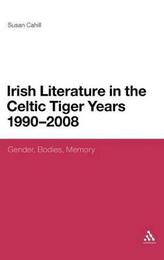
|
Irish Literature in the Celtic Tiger Years 1990 to 2008: Gender, Bodies, Memory
Hardback
Main Details
Description
When Irish culture and economics underwent rapid changes during the Celtic Tiger Years, Anne Enright, Colum McCann and Eilis Ni Dhuibhne began writing. Now that period of Irish history has closed, this study uncovers how their writing captured that unique historical moment. By showing how Ni Dhuibhne's novels act as considered arguments against attempts to disavow the past, how McCann's protagonists come to terms with their history and how Enright's fiction explores connections and relationships with the female body, Susan Cahill's study pinpoints common concerns for contemporary Irish writers: the relationship between the body, memory and history, between generations, and between past and present. Cahill is able to raise wider questions about Irish culture by looking specifically at how writers engage with the body. In exploring the writers' concern with embodied histories, related questions concerning gender, race, and Irishness are brought to the fore. Such interrogations of corporeality alongside history are imperative, making this a significant contribution to ongoing debates of feminist theory in Irish Studies.
Author Biography
Susan Cahill is Assistant Professor in the School of Canadian Irish Studies, Concordia University, Montreal, Canada.
ReviewsWith the Celtic Tiger well and truly dead, it's time for the post-mortem to begin, and this book represents a significant contribution to that process. Susan Cahill's study of a number of important novelists offers an overview of an extraordinary period in modern Irish history, as well as close analyses of some of the most sensitive artistic responses to the island's changing fortunes. In teasing out the complex interplay between time, memory and the body, Irish Literature in the Celtic Tiger Years challenges the theoretical parameters of contemporary Irish cultural criticism, while also providing a compelling vision of the vicissitudes of modern Irish identity. -- Gerry Smyth, Reader in Cultural History, Liverpool John Moores University, USA Susan Cahill's imaginative and carefully-plotted book Irish Literature and the Celtic Tiger Years 1990-2008: Gender, Bodies, Memory addresses an important lacuna and uncovers inventive and innovative ways of thinking about how some of the most important writers of the period were influenced by and responded to the pressing concerns of the day... By unpacking relevant social and cultural contexts and drawing on an impressive range of theoretical sources, the book offers an extended and meticulously detailed treatment of the oeuvres of the key authors... Theoretically incisive, engaging, and lucid, Cahill's Irish Literature in the Celtic Tiger Years 1990-2008 is a generous and important book that breaks new ground and provides an essential map of recent developments in Irish fiction-a landmark study that opens up new and vital possibilities for thinking about Irish literature in the twenty-first century. * Canadian Journal of Irish Studies *
|